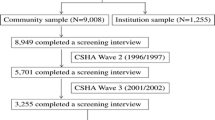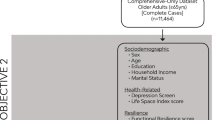Abstract
Self-discrepancy was investigated as a self-enhancing mechanism by which older women maintain their mental health and psychological well-being while coping with declines in physical health. In this 6-year longitudinal study, the mediating and moderating effects of self-discrepancy on mental health outcomes in older women with chronic health problems were tested. Participants were 103 community-dwelling older women who completed multiple, self-report measures of physical and mental health and self-discrepancy. There was a decline in physical health over time but an improvement in self-discrepancies. Low self-discrepancy (i.e., little discrepancy between the actual and ideal self) mediated and moderated the effects of physical health decline on mental health and psychological well-being. Thus, self-discrepancy appears to play a significant role in maintaining mental health in the face of declining physical health in older women.
Similar content being viewed by others
REFERENCES
American Association of Retired Persons (AARP). (2002). A profile of older Americans: 2001.PF3049(1296), AARP and Administration on Aging (AoA), US Dept HHS.
Baltes, P. B., & Baltes, M. M. (1990). Psychological perspectives on successful aging: A model of selective optimization with compensation. In P. B. Baltes & M. M. Baltes (Eds.), Successful aging: Perspectives from the behavioral sciences.New York: Cambridge University Press.
Baron, R., & Kenny, D. (1986). The moderator-mediator variable distinction in social psychological research: Conceptual, strategic, and statistical considerations. Journal of Personality and Social Psychology, 51 ,1173–1182.
Beekman, A. T. F., DeBeurs, E., van Balkom, A. J., Deeg, D. H., Van Dyck, R., & van Tilburg, W. (2000). Anxiety and depres-sion in later life: Co-occurrence and communality of risk factors. American Journal of Psychiatry, 157 ,89–95.
Birren, J. E., & Renner, V. J. (1980). Concepts and issues of mental health and aging. In J. E. Birren & R. B. Sloane (Eds.), Handbook of mental health and aging (pp. 3–33). Englewood Cliffs, NJ: Prentic Hall.
Bradburn, N. M. (1969). The structure of psychological well-being.Chicago: Aldine.
Diener, E. (1984). Subjective well-being. Psychological Bulletin, 95 ,542–575.
Duke University Center for the Study of Aging and Human Development. (1978). Multidimensional functional assessment: The OARS methodology.Durham, NC: Duke University.
Fried, L. P., Bandeen-Roche, K., Kasper, J. D., & Guralnik, J. M. (1999). Association of comorbidity with disability in older women: The women's health and aging study. Journal of Clinical Epidemiology, 52 ,27–37.
Guralnik, J. M., Leveille, S. G., Hirsch, R., Ferrucci, L, & Fried, L. P. (1997). The impact of disability in older women. Journal of American Medical Women's Association, 52 ,113–120.
Heidrich, S. M. (1994). The self, physical health, and depression in elderly women. Western Journal of Nursing Research, 16 ,544–555.
Heidrich, S. M. (1996). Mechanisms related to psychological well-being in older women with chronic illnesses: Age and disease comparisons. Research in Nursing and Health, 12 ,225–235.
Heidrich, S. M. (1998). Older women's lives through time. ANS: Advances in Nursing Science, 20 ,65–75.
Heidrich, S. M. (1999). Self-discrepancy across the life span. Journal of Adult Development, 6 ,119–129.
Heidrich, S. M., Forsthoff, C. A., & Ward, S. E. (1994). Adjustment to cancer: The self as mediator. Health Psychology, 13 ,346–353.
Heidrich, S. M., & Ryff, C. D. (1993). Physical and mental health in later life: The self-systemas mediator. Psychology and Aging, 8 ,327–338.
Heidrich, S. M., & Ward, S. E. (1992). The role of self in adjustment to cancer in elderly women. Oncology Nursing Forum, 19 ,1491–1496.
Hengudomsub, P., & Heidrich, S. M. (2002). Factors differentiating dropouts from completers in a longitudinal study of older women. Paper presented at the Midwest Nursing Research Society Annual Research Conference, Chicago, IL, March 3, 2002.
Higgins, E. T. (1987). Self-discrepancy: A theory relating self and affect. Psychological Review, 94 ,319–340.
Higgins, E. T., Bond, R. N., Klein, R., & Strauman, T. (1986). Self-discrepancies and emotional vulnerability: How magnitude, accessibility, and type of discrepancy influence affect. Journal of Personality and Social Psychology, 51 ,5–15.
Idler, E. L., & Kasl, S. (1991). Health perceptions and survival: Do global evaluations of health status really predict mortality? Journals of Gerontology: Social Sciences, 46 ,55–65.
Jackson, D. N. (1977). Reliability of the Jackson Personality Research Inventory. Psychological Reports, 40 ,613–614.
Jackson, D. N. (1979). Jackson personality inventory manual. Goshen, NY: Research Psychologists Press.
Jaur, L., & Stoddard, S. (1999). Chartbook on women and disability in the U.S. Washington, DC: U.S. National Institute on Disability and Rehabilitation Research.
Keough, K. A., & Markus, H. R. (1998). On being well: The role of the self in building the bridge from philosophy to biology. Psychological Inquiry, 9 ,49–52.
Leventhal, E. A., Hansel, S., Diefenbach, M., Leventhal, H., & Glass, D. C. (1996). Negative affect and self-report of physical symptoms: Two longitudinal studies of older adults. Health Psychology, 15 ,193–199.
Lewinsohn, P. M., Seeley, J. R., Roberts, R. E., & Allen, N. B. (1997). Center for Epidemiologic Studies Depression Scale (CESD) as a screening instrument for depression among community-residing older adults. Psychology and Aging, 12 ,277–87.
Liang, J. (1984). Dimensions of the Life Satisfaction Index A: A structural formulation. Journal of Gerontology, 39 ,613–622.
Neugarten, B. L, Havighurpt, R., & Tobin, S. (1961). The measurement of life satisfaction. Journal of Gerontology, 16 ,134–143.
Radloff, L. (1977). The CES-D scale: Aself-report depression scale for research in the general population. Applied Psychological Measurement, 1 ,385–401.
Rosenberg, M. (1979). Conceiving the self. Malabar, FL: Robert E. Krieger.
Ryff, C. D. (1991). Possible selves in adulthood and old age: A tale of shifting horizons. Psychology and Aging, 6 ,289–295.
Ryff, C. D., & Keyes, C. L. M. (1995). The structure of psycho-logical well-being revisited. Journal of Personality and Social Psychology, 69 ,719–727.
Ryff, C. D., & Singer, B. (1998). The contours of positive human health. Psychological Inquiry, 9 ,1–28.
Taylor, S. E. (1983). Adjustment to threatening events. A theory of cognitive adaptation. American Psychologist, 38 ,1161–1173.
Taylor, S. E., & Brown, J. D. (1994). Positive illusions and well-being revisited: Separating fact from fiction. Psychological Bulletin, 116 ,21–27.
Williamson, G. M., & Schulz, R. (1995). Activity restriction mediates the association between pain and depressed affect: A study of younger and older cancer patients. Psychology and Aging, 10 ,369–378.
Author information
Authors and Affiliations
Rights and permissions
About this article
Cite this article
Heidrich, S.M., Powwattana, A. Self-Discrepancy and Mental Health in Older Women with Chronic Illnesses. Journal of Adult Development 11, 251–259 (2004). https://doi.org/10.1023/B:JADE.0000044528.54943.5f
Issue Date:
DOI: https://doi.org/10.1023/B:JADE.0000044528.54943.5f




